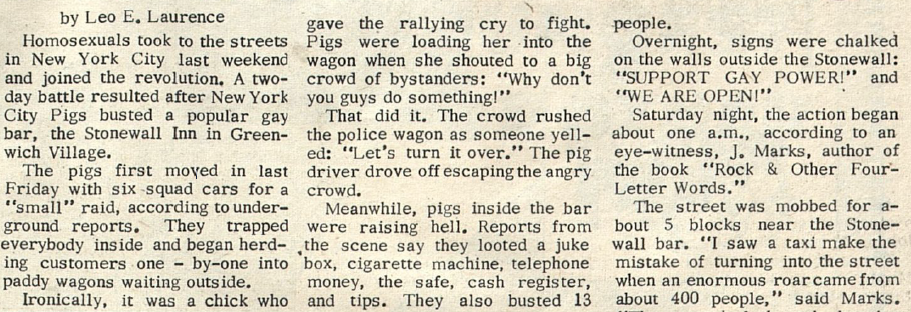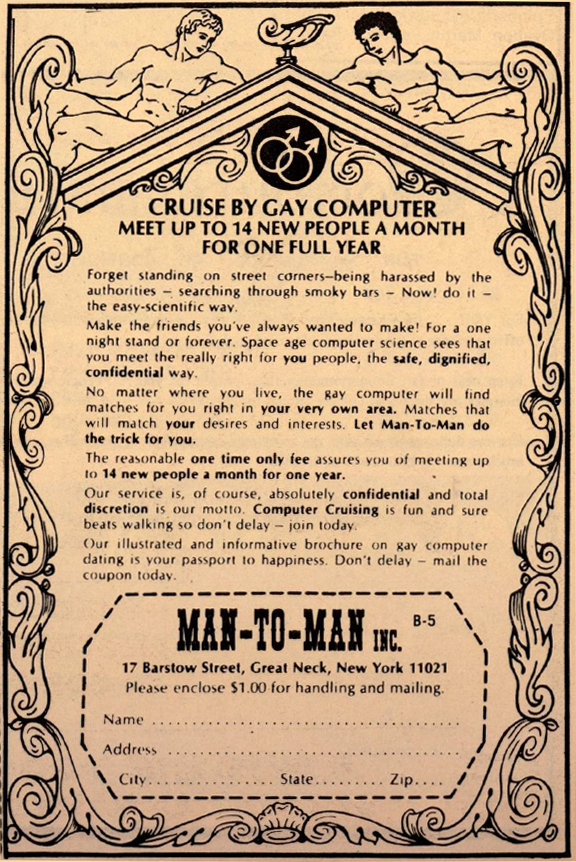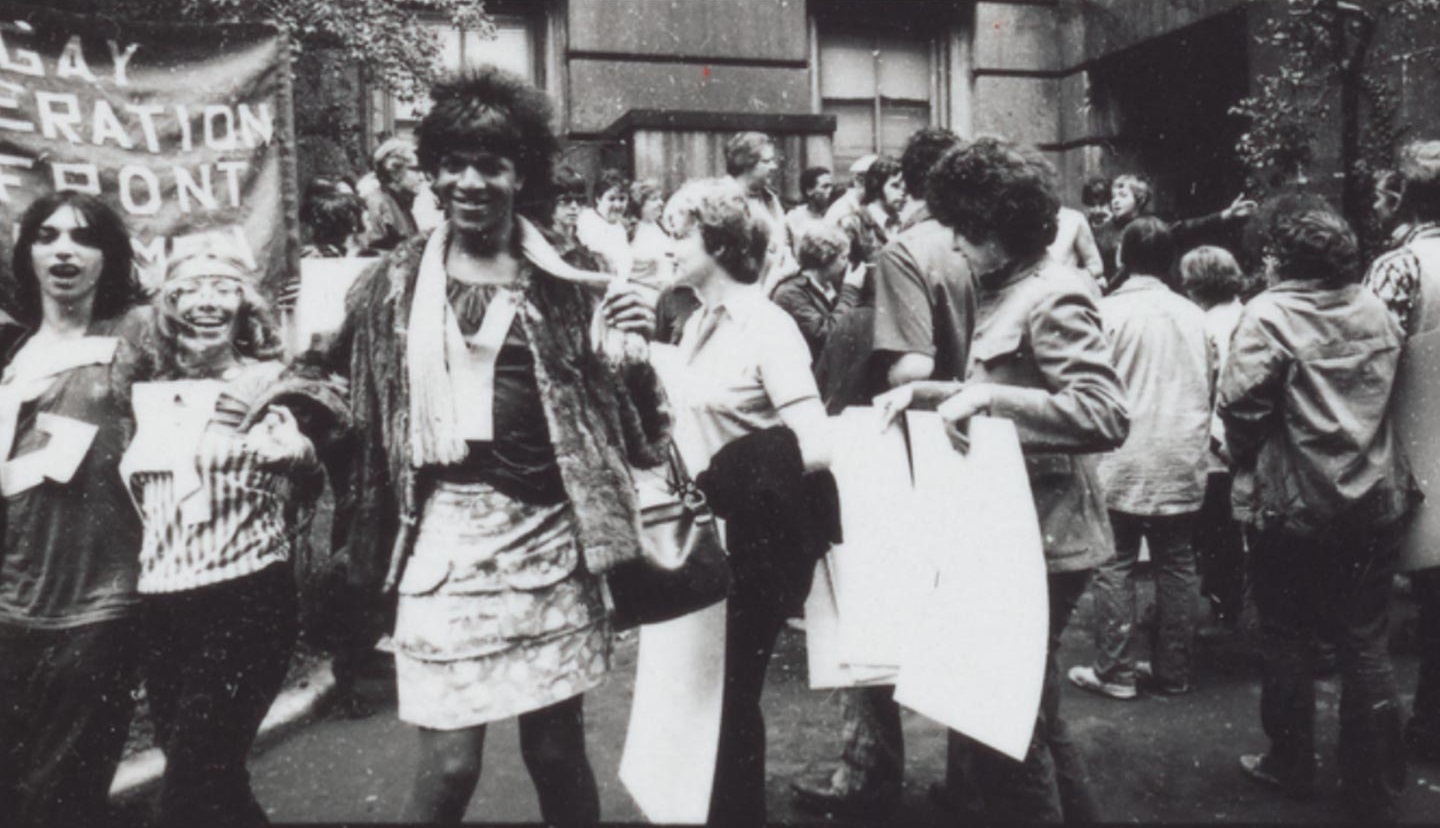[With folks like Chip Delaney and Ursula Le Guin pushing the boundaries of sex and gender, it's important to understand that they don't work in a vacuum. Everything is contextual. And late last month, the context lurched forward to catch up with the creative…]

by Erica Frank
A little over a month ago, the police in New York City decided they'd had enough of gay people (and probably hippies and activists too; you know all us freak-types stick together) and raided the Stonewall Inn in Greenwich Village. Stonewall is a gay bar that's been around since the 1930s, originally as a speakeasy. It's technically a private club — since it couldn't get a liquor license — and has faced frequent raids for no reason other than willingly hosting people considered outcasts. The warrants are usually based on "illegal sale of alcohol." But Stonewall is hardly the only establishment that slides past a liquor license; just one that faces frequent raids because the cops know most of the clientele can't fight back.
The raid on June 28th sparked unexpected resistance — and several days of protest, making national news. My local anti-cop paper, the Berkeley Barb, ran an article about it.


The article also has a mention of poet Alan Ginsberg saying, "We are one of the largest minorities in the country, ten per cent you know. It's about time we did something to assert ourselves."
The Village Voice also had some strong words. "Gay Power Comes to Sheridan Square," it announced: "The forces of faggotry, spurred on by a Friday night raid on one of the city's largest, most popular, and longest lived gay bars, the Stonewall Inn, rallied Saturday night in an unprecedented protest against the raid and continued Sunday night to assert presence, possibility, and pride until the early hours of Monday morning."
The raid began small — a few cops, trapping people in the bar and releasing them one at a time, deciding whether they were innocent customers or "instigators" of perverse crimes. The mood was festive and playful ("favorites would emerge from the door, strike a pose, and swish by the detectives") until the paddywagon arrived and arrested three of the queens in drag.
The police have a policy: Men "dressed as men" are released, even if they have heavy makeup; men dressed "partially" as women are sometimes released; men dressed "fully" as women are arrested — after being groped by a police woman to establish their identity. (If they can prove they have had a sex-change operation, they're released.)
At Stonewall, after the first few arrests and the subsequent harassment of a lesbian woman, the mood darkened. The crowd that had been ejected from the bar met with Friday night tourists and party-seekers and turned against the police.
End result: 13 arrests, charges ranging from "assault on an officer" (someone threw something in their direction) to selling alcohol without a license (the bar staff), and two cops injured. Saturday morning, Stonewall put up a sign that said they'd re-open that night — and they did.
The broken windows were boarded up — and covered with activist slogans and signs saying "Support Gay Power." Saturday night had a flamboyant protest in the street, with kissing and posing and chanting slogans. The police sent out their Tactical Patrol Force (TPF) to break up the crowd and keep the protest contained, pushing people around and refusing new entry to the area, until the activity dispersed at around 3 am. (I have to wonder if the cops take credit for that. It's a very rare party, no matter how sparkling, that continues that late.)
Sunday night had fewer chants but more "fag follies," as the Voice calls them. Alan Ginsberg visited, and called the crowd beautiful, and yelled "Defend the fairies!" as he departed.
Following the raid: The Village Voice faced a protest of its own for refusing to publish the word "gay" in an ad, but using the terms "dykes" and "faggots." Some gay men and lesbians proudly declare themselves to be "fags" or "dykes" — but others prefer more respectful terms, and the Voice does not consider their wishes.

This is not the ad the Voice refused to run, but as you can see, the Berkeley Barb has no such prejudice.
Several groups of people found each other or re-connected at the protests — the new Gay Liberation Front held its first march on July 27th but that certainly won't be its last. The GLF name was coined by Marsha P. Johnson, a drag queen formerly of the Daughters of Bilitis. It was designed to be provocative and loud, rather than quietly polite like of some "homophile" groups.

Marsha protesting in front of New York City Hall
The Gay Liberation Front has recently (this last week) published its statement of purpose:
"We are a revolutionary homosexual group of men and women formed with the realization that complete sexual liberation for all people cannot come about unless existing social institutions are abolished. We reject society’s attempt to impose sexual roles and definitions on our nature. We are stepping outside these roles and simplistic myths. We are going to be who we are. At the same time, we are creating new social forms and relations, that is, relations based upon brotherhood, cooperation, human love, and uninhibited sexuality. Babylon has forced us to commit to one thing … revolution."
And may it be a glorious, vibrant, and triumphant revolution, full of kissing in the street and ending with the right to express joyous love and pleasure without fear of violence.

